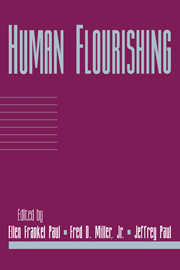Book contents
- Frontmatter
- Contents
- Introduction
- Acknowledgments
- Contributors
- Human Flourishing and the Appeal to Human Nature
- The Three Faces of Flourishing
- Flourishing Egoism
- The Idea of a Life Plan
- Human Flourishing Versus Desire Satisfaction
- Happiness and Human Flourishing in Kant's Ethics
- Valuing Activity
- Ancient Perfectionism and Its Modern Critics
- Aristotle's Elusive Summum Bonum
- Eudaimonism, Love and Friendship, and Political Community
- No Families, No Freedom: Human Flourishing in a Free Society
- Politics, Neutrality, and the Good
- Human Flourishing and Universal Justice
- Index
Human Flourishing and Universal Justice
Published online by Cambridge University Press: 05 October 2013
- Frontmatter
- Contents
- Introduction
- Acknowledgments
- Contributors
- Human Flourishing and the Appeal to Human Nature
- The Three Faces of Flourishing
- Flourishing Egoism
- The Idea of a Life Plan
- Human Flourishing Versus Desire Satisfaction
- Happiness and Human Flourishing in Kant's Ethics
- Valuing Activity
- Ancient Perfectionism and Its Modern Critics
- Aristotle's Elusive Summum Bonum
- Eudaimonism, Love and Friendship, and Political Community
- No Families, No Freedom: Human Flourishing in a Free Society
- Politics, Neutrality, and the Good
- Human Flourishing and Universal Justice
- Index
Summary
INTRODUCTION
The question of what constitutes human flourishing elicits an extraordinary variety of responses, which suggests that there are not merely differences of opinion at work, but also different understandings of the question itself. So it may help to introduce some clarity into the question before starting work on one answer to it.
That human persons are flourishing means that their lives are good, or worthwhile, in the broadest sense. Thus, the concept of human flourishing, as I understand it, marks the most comprehensive, “all-in” assessment of the quality of human lives. This concept is broader than many other concepts that mark more specific such assessments—including those of pleasure, well-being, welfare, affluence, and virtue, as well as those denoting various excellences and accomplishments. Understanding the conceptual relations in this way, one need not deny the substantive claim that the most comprehensive assessment of human lives is exhausted by one of the more specific assessments—that pleasure, say, is all there is to human flourishing. For this claim, that human flourishing is nothing more than pleasure (or virtue, or affluence, or any of the others), does not entail that the concept of human flourishing is no broader than the concept of pleasure. This latter conclusion would follow only if the contrary claim, that human flourishing is more than just pleasure, were self-contradictory, which, on my understanding of the concepts, it clearly is not.
- Type
- Chapter
- Information
- Human Flourishing , pp. 333 - 362Publisher: Cambridge University PressPrint publication year: 1999
- 1
- Cited by

